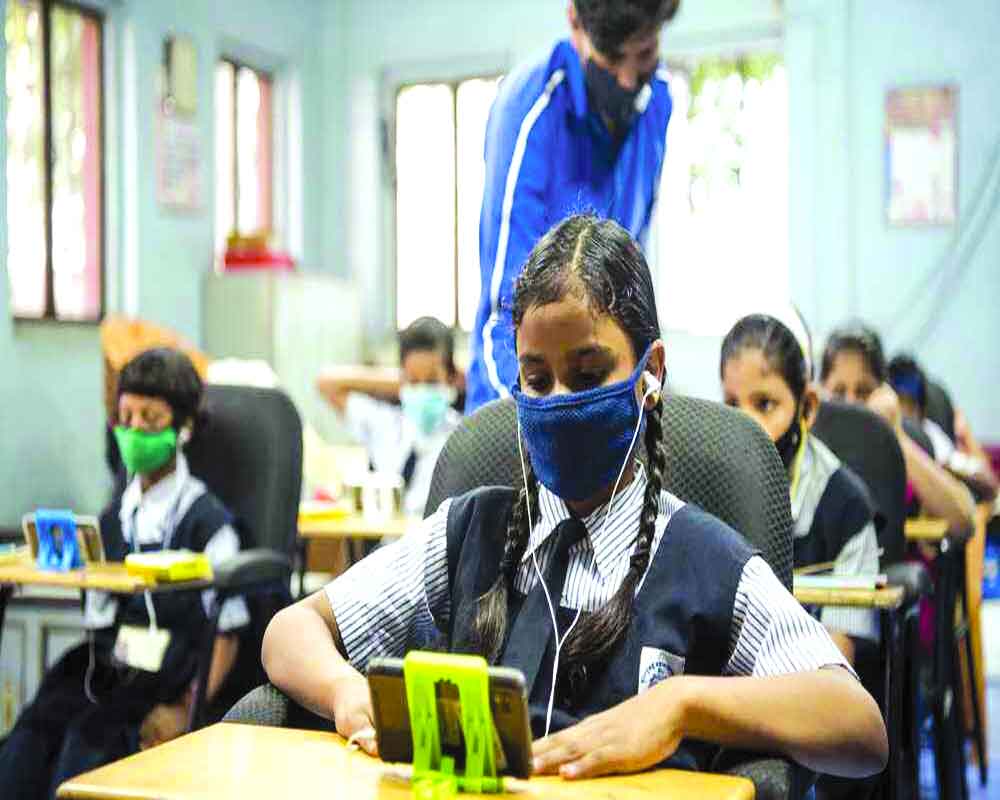The National Education Policy 2020 is being implemented at a stage when India is fully ready to take a comprehensive view of its future manpower needs
The 17 Sustainable Development Goals (SDGs) adopted by the member States of the UN are a call for global action ‘to end poverty, protect the planet and ensure that people enjoy peace and prosperity by 2030.’ These 17 goals are interlinked; action in one area would impact all others as well. The SDG-4 is to ‘Ensure inclusive and equitable quality education and promote lifelong learning opportunities for all.’ Education acculturates, liberates and leads from darkness to light. No democratic society, that assures equity and equality to one and all, could do so without fulsome universal education, so precisely and comprehensively worded in the SDG-4. While the goal is universal, the path to attain it would depend on specific requirements, resources, and cultural context of individual nations.
The Constitution of India had directed the State to ensure free and compulsory elementary education to all. In spite of several constraints, it accelerated the process to a level that now there is no community, group or organisation that does not demand quality education for both boys and girls. Further, every nation needs to enhance its cognitive capital, as it alone would be a major vehicle for its progress and development. It is in this background that in the third decade of the 21st century, countries are upgrading their education policies.
Education prepares people, and people ignite change which in the current context is being seriously impacted by socio-cultural and economic impact of information and communication technologies; ICT. It is indeed fascinating to recall how the education system has changed in India during the last seven decades. India has already begun implementing its new education policy; the NEP 2020. The experiences gained during the last seven decades would be handy in the fruitful implementation of new plans and projects aimed at achieving the SDG-4.
A thorough review of the Indian education scenario after the independence comes from Professor Jagdish Lal Azad. Azad never lost faith in education even in the most excruciating circumstance: “I don’t know how I escaped the murderous spears of the ruthless killers. I, however, saw the dead body of my mother, with her throat pierced, her left leg half burnt and her lifeless eyes half open”. He served the Planning Commission as Head of Education. An incorrigible researcher, now in his 101st year, he presents an overview of how India has strived to extend the outreach of education to every nook and corner of the nation in his latest book — Indian Education since Independence.
Nobel Laureate Gunnar Myrdal, the illustrious author of the treatise Asian Drama, considered the need for planning as “the intellectual matrix of entire modernisation ideology’. In the Indian Context, Azad infers: “The edifice of planning, however, had to be built keeping in view the political-administrative set up visualised by the Indian Constitution, particularly the federal character of the Indian administration, under which the constituent units are as much responsible for plan formulation and implementation as the Union Government”.
A paradigm shift did take place in the early nineties when economic policies laid emphasis on liberalisation, privatisation and globalisation. It led to focus on cooperative federalism which envisages that the Central and State Governments should be guided by broad national concerns of using available resources for larger benefits of people.
The NEP 2020 is being implemented at a stage when India is fully ready to take a comprehensive view of its future manpower needs, emerging aspirations of the youth and even the possibilities of demographic dividend, a possibility that could be availed globally. The Indian system is accustomed to a traditional memory based pattern that has to be transformed drastically to experiential, holistic, integrated, inquiry-driven, discovery-oriented, learner-centered, discussion-based, flexible, and, of course, enjoyable. This would be a tough transition.
Based on his research, Azad indicates: “It may be conceded that in our situation, the problems of educational management are as complex and unwieldy as their size. The inadequacies of the present management structures in education particularly at the State and District levels to cope with the far too complex challenges thrown up by the fast developing educational system in the post-independence period have been highlighted ad-infinitum.”
Consequently, changes within the system are critical, be it content, pedagogy, teacher preparation, preparation of textual materials or online and offline learning. Education in independent India has consistently faced inadequacy of resources, trained manpower, and the levels of commitment and competence on the part of functionaries at various levels.
Serious efforts are being made to ensure that every child gets that much-promised equality of opportunity in growing up a dignified citizen who has not only acquired educational but has imbibed courage, competence and character. The oft-repeated phrase of the 20th century that future empires shall be empires of knowledge has come true. Only those nations would advance further and earn global respect which shall consistently enhance their cognitive capital. The NEP 2020 is fully conscious of it and a very encouraging canvas is unfolding before the youth of India.
(The writer works in education and social cohesion. The views expressed are personal.)


























